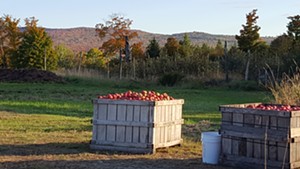It doesn't take a brain surgeon, or even a food writer, to know that we're in the midst of a hard-cider boom. In Vermont alone, the field has grown from a scant handful of producers a few years ago to more than a dozen today, and the number is growing. A few new companies are set to launch, and established ones — such as Citizen Cider and Eden Ice Cider — keep introducing new, creative products (such as Citizen Cider's Dry-Hopped Cider, shown above).
What's less known is that some of these ciders are taxed at a higher rate than beer and sometimes even wine — that is, when their ciders reach a certain level of alcohol or carbonation. When cider's abv (alcohol by volume) hits 7 percent or higher, cider is taxed as wine; and when its carbonation levels rise above a certain level, it can be slapped with a Champagne-like “luxury” tax of $3.30 per gallon. (Since alcohol levels stem from the sugar levels of a particular year's harvest, keeping those levels low can entail extra work).
Earlier this year, New York Sen. Charles Schumer (D-N.Y.) designed the CIDER Act, a bill that aims to “modernize the definition for hard apple and pear cider,” as Schumer’s office puts it, and increase the permitted alcohol and carbonation levels in cider without the attendant rise in tax.
Last week, Sen. Patrick Leahy (D-Vt.) joined Schumer in introducing the legislation, noting that apples are big business in Vermont. "Vermont is closely associated with the booming market for hard cider, and this is a great opportunity to help cider and apple producers in Vermont meet the growing demand from coast to coast, " Leahy said in a statement. The subtext is that apples are big business, for Vermont and elsewhere: Though cider represents only a fraction of the alcohol market, Americans purchased $90 million worth of hard cider last year, and companies such as Anheuser-Busch and Boston Beer Co. have rolled out their own versions.
As some cider makers have learned, American consumers prefer cider with more bubbles. “People expect carbonation and are disappointed by low levels,” said Lauren McArthur earlier this year. She co-owns Marlboro's Whetstone CiderWorks with her husband, Jason, and produces ciders whose texture and taste approximates sparkling wine. “[The tax] is frustrating and sort of a bummer.”
Eleanor Leger of Eden Cider is guardedly optimistic about the proposed bill. She and her husband, Albert, are nationally celebrated for their still ice ciders, but the couple recently released a dry, oak-aged (and scrumptious) sparkling cider. "The CIDER act will have a major impact on our sparkling cider. We are beyond the current rules for carbonation and alcohol (a perfect example of a cider made 100 percent from apples that results in higher than 7 percent alcohol), but will be within the new limits proposed in the bill," she wrote in an email. "Right now we are eating the Champagne tax, not passing [it] on to the customer in anticipation that by our next release we will be taxed at the lower hard-cider level."
At Vermont Hard Cider Company, the state's big gun when it comes to cider, communications manager Nate Formularie notes that while none of the company's ciders yet fall into the higher-taxed category, "Innovation is key to our growth, and this will certainly allow us to try some new things. But the more important reason for the carbonation change is to better meet consumer expectations. The cider category has so much potential across the country, with so many great cider operations just getting off the ground." Judging from a few off-the-record accounts, Formularie's boss, CEO Bret Williams, had a hand in influencing Sen. Leahy's involvement.
As for that dry-hopped Citizen Cider? Imagine a straw-colored, featherlight love child between a hard cider and an IPA. And carefully bottled at 6.9 percent abv — just shy of the limit where it would be taxed as wine. Clever, and possibly unnecessary come this time next year.






Comments
Comments are closed.
From 2014-2020, Seven Days allowed readers to comment on all stories posted on our website. While we've appreciated the suggestions and insights, right now Seven Days is prioritizing our core mission — producing high-quality, responsible local journalism — over moderating online debates between readers.
To criticize, correct or praise our reporting, please send us a letter to the editor or send us a tip. We’ll check it out and report the results.
Online comments may return when we have better tech tools for managing them. Thanks for reading.